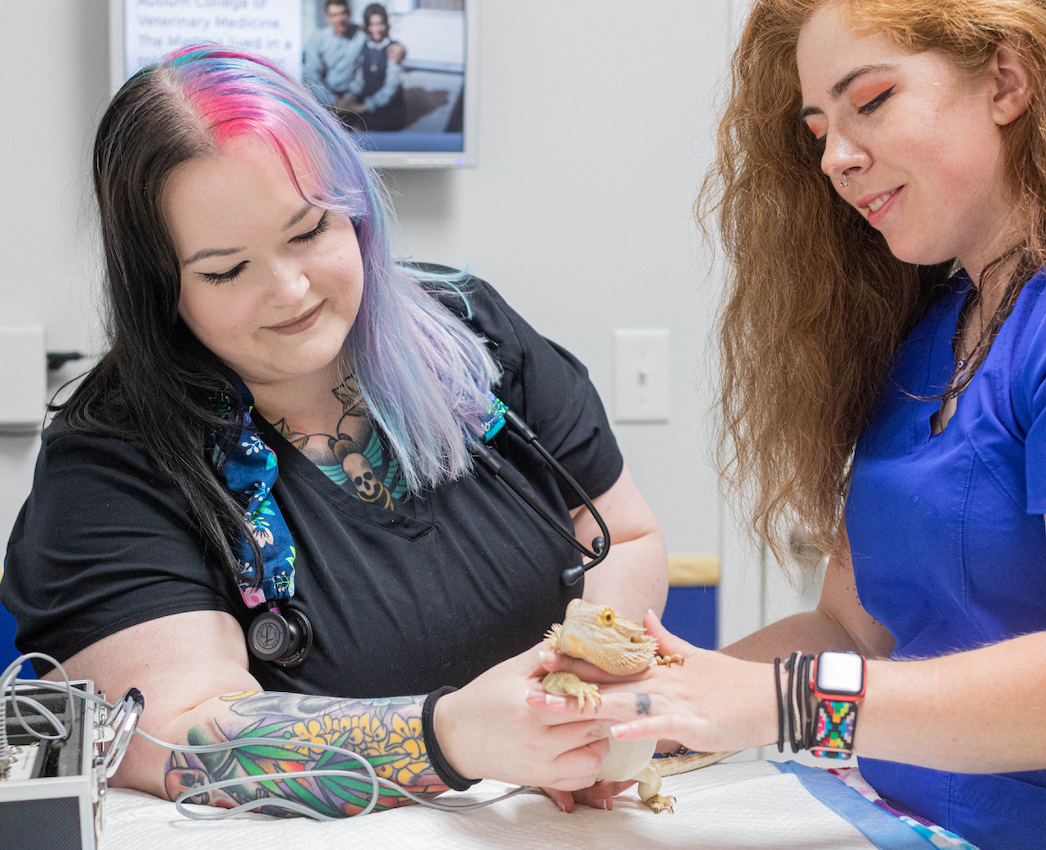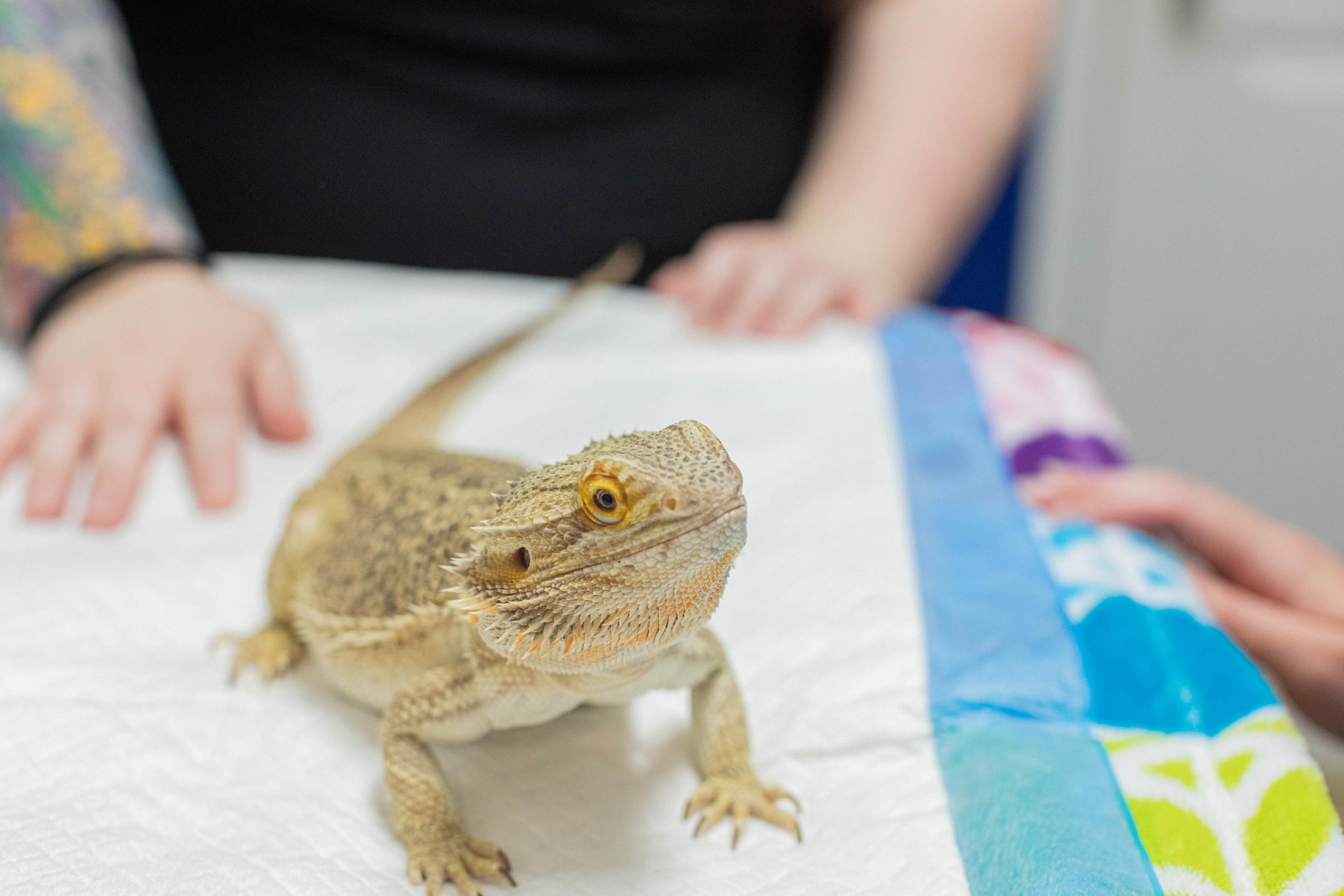Bearded Dragon Care at Advanced Animal Care ER
Your Trusted Source for Bearded Dragon Care
At Advanced Animal Care ER, we understand that Bearded Dragons are unique, fascinating pets that require specialized care. Whether you're a first-time Bearded Dragon owner or an experienced enthusiast, we are here to provide the expert care your scaly companion needs. Our team is dedicated to ensuring your Bearded Dragon thrives, from routine check-ups to emergency treatments.

What to Expect During Your Bearded Dragon's Visit:
When you bring your Bearded Dragon to Advanced Animal Care ER, you can expect comprehensive, compassionate care tailored to the unique needs of reptiles. Here’s what to expect during an initial visit:
-
Comprehensive Physical Exam: Our veterinarian will assess your Bearded Dragon’s overall condition, checking for common health concerns like skin conditions, metabolic bone disease, and parasitic infections.
-
Habitat and Diet Review: We’ll also discuss your Bearded Dragon's environment, including temperature, humidity, and diet, ensuring that they are set up for optimal health.
-
Diagnostic Testing: If needed, we may recommend bloodwork, fecal exams, or x-rays to identify any underlying health issues.
-
Personalized Care Plan: Based on the examination and test results, we'll provide a tailored care plan specific to your Bearded Dragon's needs.
Common Bearded Dragon Health Concerns We Treat:
Bearded Dragons are susceptible to a variety of health issues. Some of the most common include:
-
Metabolic Bone Disease (MBD)
-
Parasites (worms, pinworms)
-
Respiratory Infections
-
Skin Issues (shedding problems, burns)
-
Obesity and Poor Diet
Early detection and proper care can prevent many of these problems, so it's important to bring your Bearded Dragon in for regular check-ups.
Bearded Dragon Care FAQs:
What do I need for a Bearded Dragon habitat?
-
A 40-75 gallon tank for adults.
-
UVB and UVA lighting for proper health.
-
Basking area with temperatures between 95-105°F.
-
A cool side of the tank (75-85°F).
-
Non-sand substrate (e.g., paper towels or reptile carpet).
-
Climbing branches and hiding spots.
When do Bearded Dragons sleep, and what do they like to sleep on?
Bearded Dragons are diurnal (active during the day) and sleep at night. They prefer to sleep in high, secure spots like branches or rocks in their enclosure.
Are Bearded Dragons friendly/social?
Yes, Bearded Dragons are generally gentle and social creatures. They enjoy interacting with their owners and can form bonds, often seeking attention and petting.
Do Bearded Dragons need light at night?
No, Bearded Dragons should be kept on a natural day/night cycle. They do not need light at night, but they do require UVB during the day for proper calcium absorption.
What can live with a Bearded Dragon?
It’s generally best to house Bearded Dragons alone to avoid territorial issues. However, other reptiles or amphibians may be compatible with Bearded Dragons, but we recommend caution and ensuring all species' needs are met.
How do I know if my Bearded Dragon is sick or dying?
Bearded Dragons are prone to stress-related illnesses, and common signs of sickness include:
-
Lethargy or lack of appetite
-
Abnormal shedding
-
Discoloration or skin lesions
-
Labored breathing
If you notice any of these symptoms, it's crucial to bring your Bearded Dragon to a veterinarian as soon as possible.
How long can Bearded Dragons go without eating?
Bearded Dragons can typically go several days without food. However, if they stop eating for more than a week, it’s important to seek veterinary attention.
Do Bearded Dragons shed and eat their shed?
Yes, Bearded Dragons shed regularly as they grow. It’s normal for them to eat their shed skin—this behavior helps them reabsorb nutrients.
How do I tell if a Bearded Dragon is male or female?
Male Bearded Dragons tend to have a larger, wider head and two bulges at the base of their tail. Females are usually smaller, without the bulges.
What do Bearded Dragons eat?
Bearded Dragons are omnivores, meaning they need a diet that includes:
-
Insects (like crickets, mealworms, and superworms)
-
Leafy greens (collard greens, mustard greens)
-
Fruits (berries, melons, and more)
A balanced diet is essential for their health.
Do Bearded Dragons drink water?
Yes, Bearded Dragons need access to fresh water. They will often drink from a shallow water dish or lick droplets off leaves or the side of their tank.
Are Bearded Dragons cold-blooded?
Yes, Bearded Dragons are cold-blooded, meaning they rely on external heat sources to regulate their body temperature. They require both basking spots and cooler areas in their enclosure to stay healthy.
Are Bearded Dragons poisonous or venomous?
No, Bearded Dragons are non-venomous and completely safe to handle.
How big do Bearded Dragons get? How fast do they grow?
Bearded Dragons typically grow to around 18-22 inches in length. They grow quickly during their first year and stop growing at around 18-24 months.
Why is my Bearded Dragon not growing?
If your Bearded Dragon isn’t growing as expected, it could be due to improper diet, insufficient heat, or an underlying health condition. A vet visit can help identify the cause.
What are the symptoms of common Bearded Dragon illnesses?
Some common illnesses and their symptoms include:
-
Metabolic Bone Disease (MBD): Limp, weakness, deformed limbs, twitching
-
Parasites: Diarrhea, weight loss, lethargy
-
Respiratory infections: Mucus around nostrils, labored breathing
-
Heatstroke: Panting, lethargy, dark coloration
If you notice any of these symptoms, it’s important to bring your Bearded Dragon to see us right away.
How can I tell if my Bearded Dragon is male or female?
Male Bearded Dragons are typically larger with wider heads and have two bulges at the base of the tail. Females are smaller with no bulges.
What is the difference between male and female Bearded Dragons?
Males are typically larger and more robust than females. Males also have broader heads, larger beards, and tend to be more territorial.
Do Bearded Dragons need vaccinations or shots?
Bearded Dragons do not require vaccinations, but regular health check-ups are recommended, especially to screen for parasites or metabolic issues.
How can I tell the age of a Bearded Dragon?
The age of a Bearded Dragon can be estimated by size, skin texture, and behavior. A veterinarian may be able to give a more precise estimate if needed.
How long do Bearded Dragons live?
Bearded Dragons can live between 10-15 years with proper care, though some have been known to live even longer.
How soon should I bring my Bearded Dragon to the vet if it stops eating, drinking, or shows behavior changes?
If your Bearded Dragon has not eaten or drunk for 24-48 hours, or shows any significant behavior changes, we recommend bringing them in immediately for an evaluation.
Meet Razzleberry, Our Clinic Bearded Dragon:
If you're curious about Bearded Dragons and want to see one up close, come visit Razzleberry, our clinic Bearded Dragon! Razzleberry lives in an awesome tank in our front lobby, where you can check out how we set up their habitat and get a closer look at these fascinating reptiles. Feel free to stop by anytime to see Razzleberry and learn more about Bearded Dragon care!
How to Schedule an Appointment:
To schedule an appointment for your Bearded Dragon, call Advanced Animal Care Emergency at 859-625-5678. Our team is here to provide the best care for your scaly companion.

